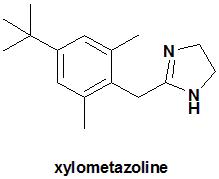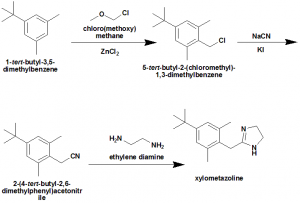XYLOMETAZOLINE Synthesis, SAR, MCQ,Structure,Chemical Properties and Therapeutic Uses
Xylometazoline
IUPAC nomenclature
2-[(4-tert-butyl-2,6-dimethylphenyl)methyl]- 4,5-dihydro-1H-imidazole.

Classification
Xylometazoline is an α1-adenergic agonist.
Physiochemical Properties
| S. NO. | PHYSICAL AND CHEMICAL PROPERTIES | |
| 1 | Molecular weight | 244.37 |
| 2 | Physical appearance | Solid |
| 3 | Melting point | 132°C |
| 4 | Solubility | 3% in water; soluble in methanol and ethanol; insoluble in ether and benzene. |
| 5 | Octanol/water partition coefficient | 3.2 |
| 6 | Presence of ring | Benzene and imidazoline ring |
| 7 | Number of chiral centers | Not present |
Mechanism of Action
i. Xylometazoline acts on α-adrenergic receptors in arteriols and mucosa.
ii. Systemic vasoconstriction due to activation of adrenal system.
iii. Decrease in blood flow and hence, decreased nasal congestion due to this.
Structure Activity Relationship
- Primary or secondary aliphatic amine separated by two carbons from a substituted benzene ring is essential for the high agonist activity.
- The hydroxyl substituted carbon must be in the R configuration for the maximal direct activity.
R1 substitution:
- When R1 is increased in size, activity of alpha receptors decreases and activity of the beta receptors increases
- Activity of both alpha and beta receptors is maximum when R1 is methyl group.
- Alpha agonist activity decreases when R1 is larger than methyl, and went negligible when R1 is isopropyl.
- Large lipophillic groups can afford compounds with alpha blocking activity.
- N-substituent provides selectivity for different receptors.
- Arylalkyl group can provide beta selectivity, increased cell penetration and increased lipophillicity for the longer duration of action.
R2 substitution:
- Ethyl group can eliminate the alpha activity of the drug.
- Erythrostero isomers have maximal activity.
- The additional methyl group makes the drug more selective for the alpha2
R3 substitution on the aromatic ring:
- 3’,4’-dihydroxy substituted benzene ring has poor oral activity.
- 3’, 5’-dihydroxy compounds are orally active.
- At least one of the groups is required which can form hydrogen bonds. And if only one group is present then it is preferred at 4’ position to retain the beta2
- If phenyl group has no phenolic substituent then it may act directly or indirectly.[2]
Method of synthesis
i. Chloromethylation of 1-tert-butyl-3,5-dimethylbenzene.
ii. Transformation of the chloromethy derivative into a nitrile.
iii. Reaction of the above formed compound with ethylenediamine gives xylometazoline.

Therapeutic Uses
Xylometazoline is used for the treatment of stuffy nose due to allergies, common cold or sinus irritation.
Side Effects
Common side effects of xylometazoline are
- dryness
- burning inside the nose; sneezing and runny nose.
Other side effects are
- wheezing,
- shortness of breath,
- light headedness,
- pounding heartbeats,
- headache dizziness and nervousness.
MCQs
Q.1 “2-[(4-tert-butyl-2,6-dimethylphenyl)methyl]- 4,5-dihydro-1H-imidazole” is the IUPAC nomenclature of which drug?
a) Xylometazoline
b) Triptorelin
c) Isoproterenol
d) Clonidine
Q.2 Number of rings present in the structure of Xylometazoline?
a) 1
b) 2
c) 3
d) 4
Q.3 Match the following with correct classifications of the drugs.
| i. Xylometazoline | A. α1-adenergic agonist. |
| ii. Triptorelin | B. ß2-adrenergic agonist |
| iii. Clonidine | C. GnRH analogue |
| iv. Isoproterenol | D. α2-adrenergic agonist |
a) i-A, ii-D, iii-B, iv-C
b) i-A, ii-C, iii-D, iv-B
c) i-C, ii-B, iii-A, iv-D
d) i-B, ii-A, iii-D, iv-C
Q.4 Correct steps for the mechanism of action of the drug Xylometazoline.
I. Activation of adrenal system
II. Action on α-adrenergic receptors in arteriols and mucosa
III. Systemic vasoconstriction
IV. Decrease in blood flow and hence, decreased congestion.
a) I – II – IV – III
b) III – II – IV – I
c) II – I – III – IV
d) IV – I – III – II
Q.5 Correct sequence for True and False for the given statements related with the SAR of drug Xylometazoline?
- When R1 is increased in size, activity of alpha receptors decreases and activity of the beta receptors increases
- At least one of the groups is required which can form hydrogen bonds. And if only one group is present then it is preferred at 4’ position to retain the beta2 activity
- Activity of both alpha and beta receptors is maximum when R1 is methyl group.
- Primary or secondary aliphatic amine separated by two carbons from a substituted benzene ring is essential for the high agonist activity.
a) TTFT
b) TTTF
c) TFTF
d) TTTT
Q.6 Cyclization of 2-(4_tert-butyl-2,6-dimethylphenyl)acetonitrile with ethylene diamine will give?
a) Oxymetazoline
b) Tetrahydrozoline
c) Xylometazoline
d) Tizanidine
Q.7 The drug Xylometazoline is mainly used as?
a) Anticancer drug
b) ANticonvuslive drug
c) Antiseptic
d) Nasal decongestant
Participate in Free GPAT MOCK Test
ANSWERS
1-a
2-b
3-b
4-c
5-d
6-c
7-d
REFERENCES
[1] Lemke TL, Zito SW, Roche VF, Williams DA. Essentials of Foye’s principles of medicinal chemistry. Wolters Kluwer; 2017, 340 [2] Lemke TL, Zito SW, Roche VF, Williams DA. Essentials of Foye’s principles of medicinal chemistry. Wolters Kluwer; 2017, 348-352